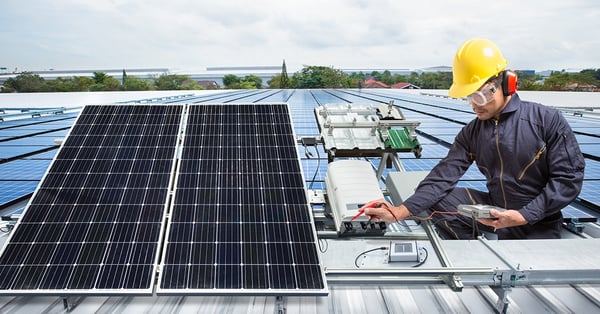
Reliable returns for solar power plants can only be determined by high-precision performance measurements on photovoltaic (PV) modules. A low measurement inaccuracy is a prerequisite for this.
"TÜV Rheinland's accredited laboratories achieve a measurement uncertainty of less than +/-1.5 percent in relation to the measured performance of PV modules," explains Dr. Werner Herrmann, Senior Expert at TÜV Rheinland.
The performance characteristics of PV modules are tested in accredited laboratories, for example, on the basis of a statistically relevant sample. The test result decides whether the contract is fulfilled or the delivery prices are to be negotiated. By lowering uncertainty of measurement in the laboratory, the more accurately the yield can be calculated, thereby reducing the risk of lower yields.
The Importance of Measurement Accuracy to Monetary Yield
In the case of a large solar system, one percent miscalculation due to inaccurate measured values in determining the yield over the 20-year term can amount to millions. For example, a 50 MW solar plant in Southern Europe with a measurement inaccuracy of only one percent can lead to a monetary yield difference of more than €300,000 per year (based on a feed-in tariff of €0.05 / kWh), which corresponds to approximately one percent.
"Measurement uncertainties can never be stated across the board. They depend on the technology of the PV module," emphasises Dr. Herrmann. For high-precision measurements, not only is the exact determination of temperature coefficients necessary, but also a measurement of spectral sensitivity.
Such a PV module calibration involves a great deal of effort and is therefore not feasible for every individual measurement of PV modules. When large samples are measured, experts usually calibrate a reference module and other PV modules relative to it. It is extremely important to achieve a reliable reproducibility of the measurement.
Accuracy Provides Better Security for Manufacturers and Investors
Regular testing of the lighting properties of laboratory sun simulators is an important quality assurance measure. If a manufacturer adjusts their sun simulators with reference to TÜV Rheinland’s measurements, the nominal output of the PV modules from production can be shown more precisely. More precise performance measurements can result in lower risk surcharges, and increase the PV modules’ value. Tolerances are also a necessary component of performance specifications in international tenders.
The reduction of the measurement uncertainty for the power rating of solar modules requires in-depth technical know-how, high-quality and regularly calibrated equipment, and intricate adjustment of many individual screws. There are more than 90 different contributions to measurement uncertainty, including temperature sensors, irradiation sensors, current and voltage measurement input, light quality and ambient conditions, as well as the technology-dependent influences of the PV modules. All these factors have to be considered and provided with measurement uncertainty contributions.
Further influencing variables include the temporal dynamics of the current-voltage measurement, the temperature and irradiation correction of the measurement curve to the nominal values under standard test conditions (STC), repeatabilities, and the spectral sensitivity of the PV modules.
"In our view, equipment and process engineering factors are assessed extremely sharply but also very conservatively. An external uncertainty contribution for the primary calibration of the reference cells used at the Physikalisch Technische Bundesanstalt is added," confirms Dr. Herrmann.
A precise measurement uncertainty analysis is a complex task in which TÜV Rheinland supports the PV module manufacturers and promotes confidence in the data sheet information – to the benefit of the investors.
Find out more about how TÜV Rheinland helped the Dubai Electricity and Water Authority (DEWA) conduct reliable and accurate PV module testing and energy yield management services for their latest solar park. And if you’re a manufacturer, be sure to check that you’re up to date with the latest international requirements for PV cables.
For more information, speak with our experts:



